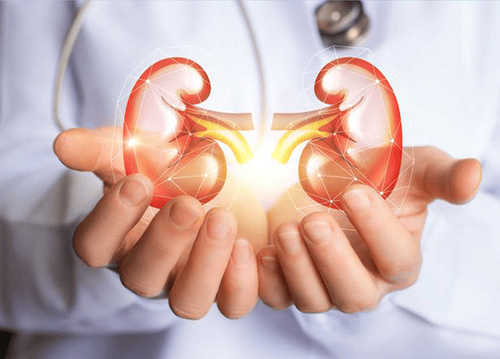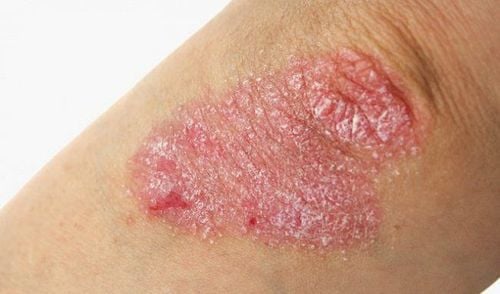This is an automatically translated article.
Living with psoriasis means you are more likely to experience other health problems such as: insulin resistance, metabolic syndrome, psoriatic arthritis, depression...1. What is Psoriasis?
Psoriasis is a chronic autoimmune disease that causes a rapid buildup of skin cells. The build-up causes the skin's surface to stretch, causing symptoms such as inflammation, redness, and scabs. These typical scales are white and develop into thick red patches. Sometimes, these scaly patches can crack and bleed.
Psoriasis is the result of accelerated skin production. Normally, skin cells grow deep in the skin and slowly rise to the surface and eventually fall off to let new skin cells emerge. This whole process can take about a month. However, this process only occurs within a few days in people with psoriasis. As a result, the skin cells do not have time to shed and together with the overproduction of skin cells causes a buildup on the surface of the skin.
Psoriasis scales often develop anywhere on the body, especially joints, elbows, knees, hands, feet, neck, scalp, face... few photos Affects location in fingernails, mouth and area around genitals.
2. Psoriasis is associated with health problems

Bệnh nhân bị viêm khớp vảy nến
Inflammation causes skin symptoms that can affect the entire body.
2.1 Psoriatic arthritis This type of arthritis mainly affects people with psoriasis. In the Journal of the European Academy of Dermatology and Hospitals, nearly 1 in 10 psoriasis patients develop psoriatic arthritis. candle.
Usually, the patient will have skin symptoms before noticing joint problems. Psoriatic arthritis can cause long-term disease, so it is important to detect it early so that it can be treated effectively. If the disease is not treated early enough to help control arthritis, it can damage joints or cause permanent disability.
Patients experiencing signs such as being more tired than usual or having a lot of pain should see a doctor to be able to diagnose the cause and have an appropriate treatment plan.
2.2 Heart disease Psoriasis can triple the chance that someone with the condition may develop heart disease and stroke. The disease can damage blood vessels to the heart and brain. Therefore, to prevent this situation, patients should always monitor their blood pressure and cholesterol levels and must not smoke or completely quit smoking.
In addition, try to exercise and adopt a healthy diet, and visit your doctor regularly to control your skin symptoms. This will help control inflammation in the body.

Trẻ em mắc bệnh vẩy nến có thể mắc bệnh béo phì
2.3 Obesity Adults and children with psoriasis are more likely to become obese. As body mass increases, skin symptoms become worse. Because fat cells release proteins that can trigger inflammation (genes inherited from a parent or sibling with the disease also play a part).
2.4 Type 2 diabetes Psoriasis causes inflammation in the body. At that time, inflammation will make it difficult for cells to absorb sugar from the food that is loaded into the body. This excess sugar can build up in the blood and lead to diabetes.
People with psoriasis can lower their blood sugar with regular exercise and a diet rich in dietary fiber. If you have psoriasis, you should have your diabetes checked and your blood sugar checked regularly. This will help doctors detect it earlier and treat it more effectively.
2.5 Metabolic syndrome Metabolic syndrome is a condition characterized by high blood pressure, increased waist circumference, increased blood sugar due to insulin resistance, and elevated blood fats.

Bệnh vẩy nến có thể làm tăng nguy cơ bị ung thư da
2.6 Crohn's Disease Intestinal problems like Crohn's disease are caused by the same type of inflammation and some similar genes as psoriasis. If a person with psoriasis has symptoms such as abdominal pain, cramps, and bloody urine or unexplained weight loss, it is important to see a doctor.
In addition, the patient can use some foods that have good anti-inflammatory effects for both these diseases, such as: fruits, green vegetables, salmon and olive oil.
2.7 Uveitis Uveitis is an inflammation of the inside of the eye that can lead to symptoms such as eye pain, redness, blurred vision, and sensitivity to light.
Psoriasis may potentially increase the incidence of eye problems including uveitis. Some types of uveitis can cause vision loss, so see your doctor right away if you notice any unusual changes in your vision.
2.9 Cancer Psoriasis can increase the incidence of lung cancer, skin cancer and lymphoma, and it also affects the immune system.
Studies show that chronic inflammation associated with psoriasis can promote tumor growth. But sometimes researchers aren't sure if this is due to psoriasis or the treatments people receive.
2.10 Non-alcoholic fatty liver disease In a recent study, half of people with psoriasis had fatty deposits in the liver (NAFLD). Normally, people will have no symptoms, but it can lead to serious liver problems.
To help prevent this condition, the patient should exercise, lose weight, especially stay away from alcohol products, high-fructose corn syrup.

Bạn bị bệnh vẩy nến nặng có thể ảnh hưởng đến thận
2.11 Kidney disease Severe psoriasis can affect the kidneys. This has been found in several studies. For people with psoriasis less than 3% of the body, it is likely that there will be no problems with health problems.
People with psoriasis can watch for swollen ankles, or signs like fatigue and urinating more than usual. If you experience these symptoms, you should see your doctor to be checked to see how your kidneys are working.
2.12 Pregnancy Complications A pregnant woman suffering from the disease must face adverse outcomes such as premature birth, low birth weight, etc. These could be due to inflammation or a condition. Several methods are used to treat psoriasis.
For example, Restoration (cyclosporine) - is an immunosuppressive drug approved for people with severe psoriasis, but some studies have evidence that it can harm a developing fetus. develope.
2.14 Polycystic Ovarian Syndrome Polycystic ovary syndrome (PCOS) is a condition of the female reproductive system that causes small cysts or small sacs of fluid to form in the ovaries. A study published in March 2013 in the journal Fertility and Sterility found that the prevalence of PCOS was significantly higher, and six times higher, in women with psoriasis.
2.15 Chronic Obstructive Pulmonary Disease Psoriasis-related inflammation can affect the lungs and increase the risk of chronic obstructive pulmonary disease (COPD). A study published in January 2012 in the Journal of the European Academy of Dermatology and Hospitals concluded that psoriasis patients have a higher risk of developing COPD.
Vinmec International General Hospital is one of the hospitals that not only ensures professional quality with a team of leading medical doctors, modern equipment and technology, but also stands out for its examination and consultation services. comprehensive and professional medical consultation and treatment; civilized, polite, safe and sterile medical examination and treatment space. Customers when choosing to perform tests here can be completely assured of the accuracy of test results. Please book an appointment on the website for the best service.
Please dial HOTLINE for more information or register for an appointment HERE. Download MyVinmec app to make appointments faster and to manage your bookings easily.
Articles refer to the source: webmd.com, everydayhealth.comSEE MORE:
Psoriasis is difficult to treat definitively Is scalp psoriasis contagious and cannot be treated? Genetic factors in atopic dermatitis













